4 Things to Consider When Planning an Industrial Epoxy Floor Coating Project
Industrial epoxy floor coatings are a great way to protect and enhance the look of a concrete floor in commercial and industrial buildings. They provide an attractive finish that is also highly durable and more resistant to most chemicals compared to just concrete floors, making them ideal for many different epoxy applications – from storage facilities to epoxy warehouse flooring.
When it comes to industrial floor coating projects, there are a lot of factors to take into consideration. It’s important to make sure that the epoxy you choose can handle high levels of foot traffic and chemical spills, as well as remain resilient over time against impacts from heavy machinery or objects. It’s also essential to consider surface preparation, installation methods, application techniques, and more when planning your project. To help ensure success with an industrial epoxy flooring project, we’ll discuss here four key points for owners in any industry to consider before beginning their journey toward a durable and reliable floor coating.
What is industrial epoxy flooring?
Industrial epoxy floor coatings are a combination of several different materials, including epoxy resin, filler materials such as quartz, and hardeners. When these components are mixed they form a strong chemical bond that creates a tough yet attractive finish on concrete floors. This type of coating is highly resistant to wear from foot traffic, impact damage from dropped objects or heavy machinery, and most chemicals. Epoxy flooring solutions are also easy to clean and maintain over time, which makes them ideal for industrial purposes.or even inside of a Greenhouse or Warehouse.
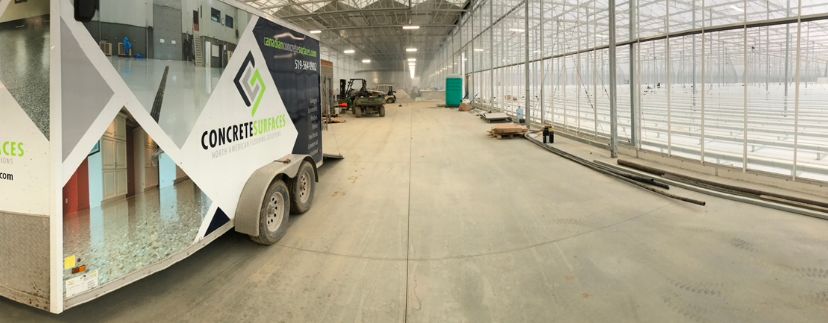
What are the benefits of using industrial epoxy floor coatings?
Cost-Effective
Industrial epoxy floor coatings are a great choice for any facility as they can be installed quickly and at a fraction of the cost compared to other flooring options. They are cost-effective as a result of the following:
- Quick and easy installation – Industrial epoxy flooring can be installed quickly and easily with minimal preparation required.
- Durable – Industrial epoxy floor coatings are highly durable, lasting for years without needing to be replaced or repaired.
- Resistant to wear, tear, and chemicals – Epoxy coatings are resistant to wear from foot traffic, and impact damage from heavy machinery or dropped objects. They are chemical resistant and stain resistant.
- Low maintenance – Industrial epoxy floor coatings require minimal maintenance over time so you don’t need to spend money on regular repairs or replacements.
Easy to Install
Epoxy floor coatings are easy to install and can be applied in just a few hours. The installation process is relatively straightforward, and with the right preparation, it can be done quickly without having to hire professionals. The simple installation process includes:
- Cleaning and prepping the surface – The first step is to thoroughly clean the floor so that no debris or dust remains. This ensures a smooth, even finish for the epoxy coating.
- Applying primer – A special primer is then applied to the concrete surface to create a secure bond between the epoxy and the concrete.
- Mixing and applying epoxy – Once the primer has dried, it’s time to mix and apply the epoxy resin mixture onto the floor with rollers or brushes before it starts hardening.
- Letting it dry – After application, you need to let the industrial epoxy floor coating cure before you can walk on it or move heavy objects over it.
Durable and Scratch Resistant
Industrial epoxy floor coatings are highly resistant to wear from foot traffic and impacts from heavy machinery or dropped objects. They also offer excellent protection against most chemicals, which is ideal for areas that may come into contact with corrosive substances. This makes them a great choice for any industrial setting where spills and accidental damage are more likely to occur than in other environments. Plus, industrial epoxy coatings are highly scratch-resistant so they can withstand continuous wear over time without showing signs of damage. They are scratch resistant because of their thick, durable, and solid finish, which provides an extra layer of protection to the floor beneath.
Chemical Resistance
Industrial epoxy floor coatings are highly resistant to most chemicals, making them a great choice for areas that may come into contact with corrosive materials. This type of coating can handle spills and other accidents without suffering any damage, ensuring your floor remains safe and protected from harm. They are resistant to chemicals because of their solid finish that prevents any corrosive materials from penetrating the floor beneath.
Good Slip Resistance
Industrial epoxy coatings are designed to be slip-resistant; their texture provides an extra layer of grip on the floor to prevent any slips or falls, making them an ideal choice for areas where workers or visitors may come into contact with wet surfaces. This type of coating provides excellent traction and is perfect for ensuring the safety of employees in any industrial factory setting, especially in areas where water or other liquids like oils and acids may be present.
Easy to Maintain
Industrial epoxy floor coatings are easy to clean and maintain over time. Most dirt and debris can be wiped away easily with soap and water or by just sweeping, and they are resistant to most chemicals, so they won’t be damaged by them. This makes them ideal for high-traffic areas where spills and dirt accumulation may occur more frequently.
Maintaining epoxy floors includes:
- Vacuuming – Regularly vacuum the floor to remove any dirt or debris that may have accumulated over time.
- Sweeping – Sweep the floor regularly with a broom and dustpan to get rid of any dirt or dust particles that may have settled on the surface.
- Cleaning – Clean the epoxy floor using a mild soap and warm water solution and mop it periodically to keep it looking its best.
- Sealing – Every so often, apply a sealant over the epoxy coating to provide an extra layer of protection against wear and tear. This will also help maintain its glossy appearance for longer.
Epoxy flooring maintenance is easy and straightforward, so you won’t have to worry about spending a lot of time or money on upkeep. Plus, it can last for many years when properly maintained.
What to Consider When Planning an Industrial Epoxy Floor Coating Project
Before you begin a project to install an industrial epoxy floor coating, it’s important to evaluate all the factors that need to be taken into account.
1: Research the different types of industrial epoxy floor coatings
There are many different types of industrial epoxy floor coatings available and it’s important to research each one to determine which one is best suited for your particular needs. Consider factors such as cost, durability, chemical resistance, slip resistance, and installation requirements before making a decision.
Some types of industrial epoxy floor coatings include:
Mortar epoxy flooring
This type of epoxy flooring is made up of a mix of cement and epoxy resin, which produces an extremely durable finish that is great for high-traffic areas. It comprises 100% epoxies and graded sand. Mortar epoxy is also used to repair current epoxy flooring, which then enables a different type of epoxy to be laid on top. It can mostly be used in spaces like warehouse floors, industrial kitchens, restaurants, mechanical workshops, and garage floors.
Flake epoxy flooring
This type of epoxy flooring is made up of a layer of epoxy resin that is embedded with decorative flakes or chips. This provides an attractive, eye-catching finish that adds texture and depth to the floor while also protecting it from wear and tear. The flakes in the epoxy also increase safety because they provide more traction on the surface, thus less slipping incidents. Flake epoxy comes in different sizes and colours as well, meaning that it can easily be customized for any space. Flake epoxy is great for commercial spaces like:
- Retail stores
- Clinics
- Restaurants
- Car showrooms
- Garages
Gravelled epoxy flooring
This type of epoxy flooring is made up of a layer of epoxy resin with small pebbles embedded into it. The pebbles provide an attractive finish and can be laid in various colours and decorative options, as well as additional traction, making them great for areas that are frequently wet and prone to slipping hazards. Gravelled epoxy flooring is perfect for commercial spaces like:
- Pools
- Spas
- Locker rooms
- Industrial kitchens
- Garages.
Metallic epoxy flooring
This type of epoxy flooring is made up of a layer of epoxy resin mixed with metallic pigments. This combination creates an eye-catching, shimmery finish that is perfect for making any space look luxurious and modern. Metallic epoxy can be used in residential spaces like living rooms, bathrooms, or bedrooms, as well as commercial settings such as offices, retail stores, and restaurants.
Self-levelling epoxy flooring
This type of epoxy flooring is great for covering concrete surfaces, and is commonly used for:
- Smoothening damaged, old, or cracked floors
- Can also be laid on different surfaces
The advantage of this type of floor coating is that it can be applied quickly and is less labour intensive, meaning you don’t have to spend too much time or energy on the installation process. Self-levelling epoxy is great for garages and other industrial settings where a strong, durable finish is needed.
2: Determine the need for durability and aesthetics
Different types of industrial epoxy floor coatings offer different levels of protection, so it’s important to consider the type of environment you need the coating for before making a decision. If you’re looking for a long-lasting finish that can withstand heavy foot traffic or wear and tear, then mortar epoxy flooring may be best. On the other hand, if you’re looking for an attractive finish that adds texture and depth to your space, then flake or metallic epoxy may be more suitable.
It depends on the kind of aesthetic that you are trying to achieve, as well as the level of durability that you need. If your goal is to have a unique and eye-catching space, then that is what you will be going for in terms of the floor coatings, but you can achieve both durability and aesthetics with certain types of floor coating options.
3: Consider requirements for maintenance and cleaning
Epoxy floor coatings are very low-maintenance and require minimal cleaning. However, there are some things you should consider when planning for an epoxy floor coating project. Most epoxy systems require a sealant to be applied after the base coat is laid down, to protect it from staining, oil spills, and other contaminants. This sealant should be reapplied regularly to ensure the floor’s longevity.
Additionally, while epoxy floors are easy to clean, if any spills occur they must be cleaned up as soon as possible to prevent staining and damage. Additionally, most epoxy floor coatings are not recommended for areas with high humidity or water saturation as this can cause the coating to break down over time.
4: Look into the safety standards of the product
When choosing an epoxy floor coating, it’s important to make sure that the product meets safety standards. Most industrial epoxy systems are slip-resistant, making them a great choice for areas where slipping hazards are a risk. Additionally, some products have anti-static properties which can help reduce dust and debris in the air.
Finally, be sure to look into the toxicity of the product as well. Many epoxy systems contain VOCs (volatile organic compounds) which can be harmful if inhaled or absorbed through skin contact. It is best to choose products with low levels of VOCs or those labelled as non-toxic or eco-friendly. This is because VOCs are released into the air when epoxy coatings are curing and can be dangerous if breathed in for extended periods of time.
FAQs
Some of the frequently asked questions when it comes to industrial epoxy floor coatings include the following:
What are the various applications of industrial epoxy floor coating?
Industrial epoxy floor coating is used in a wide variety of settings, from residential homes and commercial buildings to garages and workshops:
- Warehouse and industrial units – Epoxy coatings are ideal for covering large areas of concrete like a warehouse floor quickly and efficiently.
- Shops and retail – The attractive finish of epoxy flooring can add a touch of style to any shop or retail space.
- Garages and workshops – Industrial epoxy is great for garages and workshops as it provides an extra layer of protection against oil and grease spills.
- Food preparation areas – Epoxy floor coatings are also suitable for food preparation areas, as they provide a non-porous surface that is easy to clean and hygienic.
- Gyms – Epoxy coatings can provide extra cushioning and grip for gym floors, as well as a durable finish that is resistant to wear and tear.
- Restrooms and locker rooms – some epoxy systems are designed specifically for wet areas or areas with high foot traffic.
What is the installation process for industrial epoxy floor coating?
The installation process for industrial epoxy floor coating can vary depending on the size and complexity of the project. Generally speaking, though, it involves the following steps:
- Prepping the surface – This includes cleaning, removing any existing coatings, repair of cracks or damage, and etching if necessary.
- Applying a primer – Once the surface is prepped, a primer should be applied to ensure proper adhesion of the epoxy system.
- Laying down the base coat – The base coat forms the backbone of the flooring system and varies depending on the specific product used.
- Applying sealant – A sealant should be applied after the base coat is laid down to protect it from staining, oil spills, and other contaminants.
- Applying additional coats – Depending on the specific product chosen, additional layers may need to be applied for extra protection or aesthetics.
- Curing – After all the layers have been applied, the epoxy should be left to cure before it can be walked on.
- Final clean up – After curing is complete, all excess material should be cleaned up and the floor should receive a final inspection before being used again.
What is the lifespan of industrial epoxy floor coating?
The lifespan of industrial epoxy floor coating can vary depending on the product and whether it is applied correctly, but it typically lasts between 10 to 20 years. This is assuming that the system was installed correctly, maintained properly, and not exposed to extreme temperatures or excessive moisture. With proper care and maintenance, the lifespan of epoxy floor coatings can be extended significantly by:
- Cleaning regularly – Dirt, debris, and spills should be cleaned up as soon as possible to prevent staining or damage.
- Regular inspections – Periodic inspections should be done to identify any potential problems before they become severe.
- Proper maintenance – If the floor is exposed to heavy traffic or chemical exposure, the surface must be resealed from time to time to protect it from wear and tear.
- Reapplying sealant – Sealants should be reapplied every few years to extend the life of the system and keep it looking its best.
- Avoiding extreme temperatures – Exposure to extreme temperatures can cause premature aging of the epoxy system, so when possible, it should be kept in a temperature-controlled environment.
What is the cost of industrial epoxy floor coating installation?
The cost of industrial epoxy floor coating installation can vary depending on the size and complexity of the project. Generally speaking, though, most projects range from $3 – $12 per square foot or $1000- $3000. This includes both labour and materials such as epoxy and other necessary supplies. The total cost can also be affected by factors such as:
- Preparation – If more extensive preparation and repair are required, the cost will be higher.
- Application method – Whether you choose a trowel or spray application can affect the total cost of installation.
- Location – Installation in a confined area or remote location may require additional labour costs for logistics or transportation.
- Product type – Different epoxy systems can have varying costs depending on their durability, quality, and other features.
- Installation complexity – The overall complexity of the project can cause costs to increase if special equipment or techniques are needed to complete it successfully.
Canadian Concrete Surfaces: Your Industrial Epoxy Floor Coating Experts
Industrial epoxy flooring is an excellent choice for businesses and companies that want a durable and cost-effective floor coating option. It has several benefits, such as easy installation, resistance to scratches and other damage. But even with all these benefits, there are some things you need to consider when deciding what floor coating to use. Research the types of epoxy options available, decide on the level of durability and aesthetics needed, and think about maintenance requirements, as well as the safety standards recommended by product manufacturers.
If you are looking for experienced professionals in epoxy floor installations or any other type of flooring, including concrete polishing, look no further than Canadian Concrete Surfaces. We have 25 years of experience in the industry and the knowledge and expertise required to ensure your project gets done efficiently and safely. Customer satisfaction is our priority. Contact us today and let us help you create a safe work environment while also boosting the aesthetic excellence of your property.

Devon has over 25 years of experience providing customers with high performance epoxy flooring to fit any need or budget. Referrals are our best friend and customer satisfaction is always our top priority. When Devon is not working you can find him fishing, or hunting across North America.
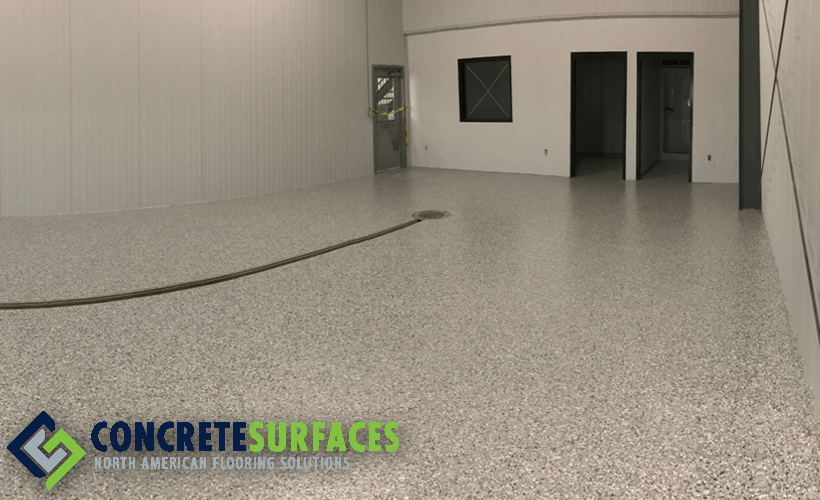

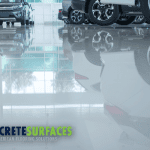
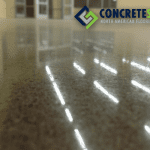
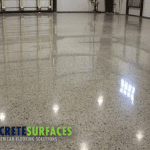
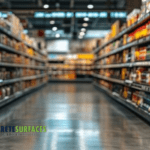
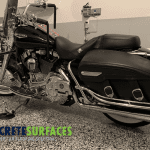
Share This Article
Choose Your Platform: Facebook Twitter Google Plus Linkedin